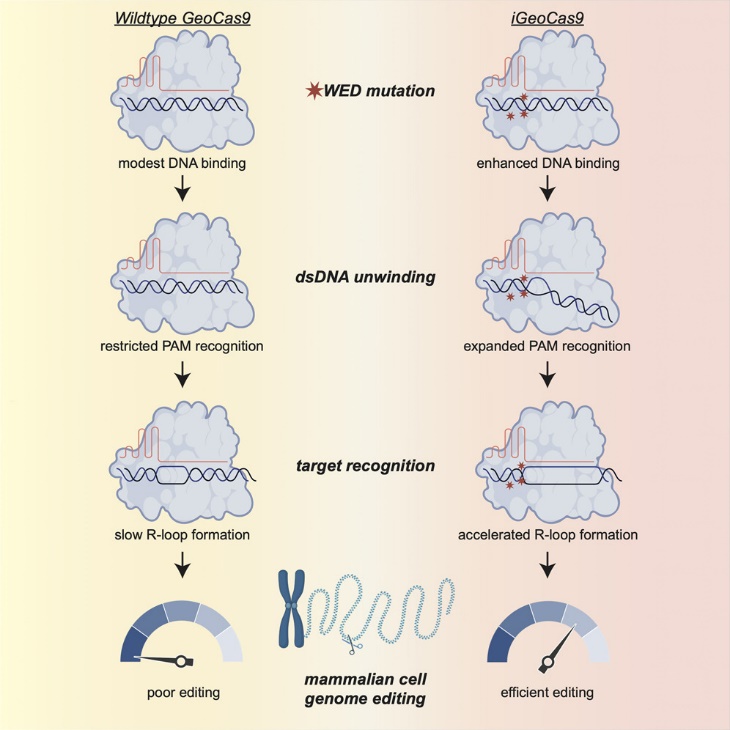
Introduction
The advent of CRISPR technology has revolutionized genome editing, offering unprecedented precision and versatility. Central to this innovation are the clustered regularly interspaced short palindromic repeats (CRISPR) and CRISPR-associated (Cas) proteins, which provide adaptive immunity in prokaryotes by targeting and cleaving the DNA of invading viruses and mobile genetic elements. The CRISPR-Cas9 system, particularly from *Streptococcus pyogenes* (SpyCas9), has become a cornerstone for research and clinical applications due to its programmable guide RNA, which directs the Cas9 protein to specific DNA sequences for editing.
GeoCas9: A New Contender with Thermostability
While SpyCas9 remains the most widely used, its sensitivity to aggregation and proteolytic degradation can hinder its effectiveness in various environments. This has led researchers to explore other Cas9 variants, such as the thermostable Cas9 from *Geobacillus stearothermophilus* (GeoCas9). Initially, it was hypothesized that GeoCas9 would enhance genome-editing activities due to its extended protein lifetime. However, experimental evidence showed that GeoCas9 was a poor editor in human cells despite its thermostability.
iGeoCas9: Engineered for Enhanced Activity
To overcome the limitations of GeoCas9, scientists applied directed evolution to engineer variants with improved editing activity and expanded protospacer-adjacent motif (PAM) flexibility. This process yielded iGeoCas9, an engineered version of GeoCas9 with mutations in the wedge (WED) domain that significantly increased genome-editing efficiencies by more than 100-fold.
Understanding the Mechanisms
To understand why iGeoCas9 outperforms its predecessor, researchers used cryoelectron microscopy (cryo-EM) and biochemical analysis to compare the structures and behaviors of wild-type and iGeoCas9 enzymes. They found that the three key WED-domain mutations in iGeoCas9 establish new interactions with target double-stranded DNA (dsDNA), enhancing DNA binding and relaxing PAM specificity. This improved DNA binding accelerates DNA unwinding, thereby expanding the target sequence space.
Furthermore, the WED-domain mutations allow iGeoCas9 to function effectively at lower magnesium ion concentrations, which are typical in mammalian cells but not in bacterial cells. This enables iGeoCas9 to maintain high activity in environments where wild-type GeoCas9 would be less effective.
Broader Implications and Future Directions
The success of iGeoCas9 has broader implications for the field of genome editing. The insights gained from engineering iGeoCas9 have been applied to other Cas9 proteins, such as Nme2Cas9, resulting in new variants with enhanced genome-editing activities. These advancements suggest that optimizing the WED domain can create robust genome editors with expanded PAM compatibility and improved editing efficiency.
Overall, the development of iGeoCas9 marks a significant milestone in the evolution of genome-editing technologies. By continuing to explore and engineer new Cas9 variants, researchers can unlock even greater potential for CRISPR-based applications in medicine, agriculture, and beyond.

Check out our AAV CDMO service to expedite your gene therapy research
PackGene Biotech is a world-leading CRO and CDMO, excelling in AAV vectors, mRNA, plasmid DNA, and lentiviral vector solutions. Our comprehensive offerings span from vector design and construction to AAV, lentivirus, and mRNA services. With a sharp focus on early-stage drug discovery, preclinical development, and cell and gene therapy trials, we deliver cost-effective, dependable, and scalable production solutions. Leveraging our groundbreaking π-alpha 293 AAV high-yield platform, we amplify AAV production by up to 10-fold, yielding up to 1e+17vg per batch to meet diverse commercial and clinical project needs. Moreover, our tailored mRNA and LNP products and services cater to every stage of drug and vaccine development, from research to GMP production, providing a seamless, end-to-end solution.
Related News
Sangamo Therapeutics Secures Accelerated Approval Pathway for Gene Therapy in Fabry Disease
Sangamo Therapeutics has announced a major advancement in its gene therapy program for Fabry disease, as the U.S. FDA has provided a clear pathway for Accelerated Approval. This decision could potentially speed up approval timelines by three years, with a Biologics...
[2024/10/18] Gene and Cell Therapy- weekly digest from PackGene
FeaturedNewsArticlesPackGene's NewsletterReceive the latest news and insights to your inbox.About PackGenePackGene Biotech is a world-leading CRO and CDMO, excelling in AAV vectors, mRNA, plasmid DNA, and lentiviral vector solutions. Our comprehensive offerings span...
GSK sues Moderna over mRNA vaccine patents, seeks ‘reasonable royalty’
GSK on Tuesday unveiled a lawsuit filed against Moderna in Delaware federal court, alleging that its patented inventions provide the “foundation” for Moderna’s mRNA vaccine portfolio. GSK said it’s looking to recover “a reasonable royalty” for Moderna’s tens of...
Gene Therapy Automatically Converts Omega-6 to Omega-3 Fatty Acids in the Body
Shriners Children's Develops New Technology to Prevent Childhood Obesity ST. LOUIS, Oct. 16, 2024 /PRNewswire/ -- According to the Centers for Disease Control, nearly 20% of children and teens are considered obese. Research shows it can have a dramatic impact on a...
Related Services

Plasmids GMP Services

AAV GMP Services


